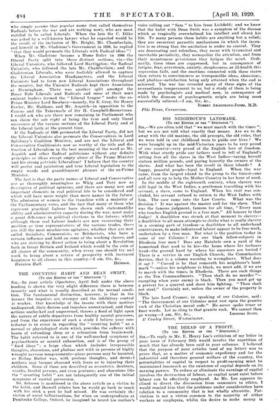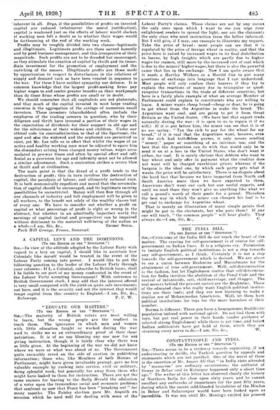THE DREAD OF A PROFIT.
[To THE EDITOR OF THE " SPECTATOR.] SIR,—To reply to Mr. E. Henry Lee's criticism of my letter in your issue of February 28th would involve the repetition of much that has already been said in your columns. I believed that the purpose of your articles (and of my letter) was to prove that, as a matter of economic expediency and for the industrial and therefore general welfare of the country, the potentialities of capital in respect to profit-earning must be maintained inasmuch as the existence of capital depends on its earning powers. To reduce or eliminate the earnings of capital • involves the destruction of labour, as capital must exist before labour can be effectively employed. As Mr. Lee appears in- clined to divert the discussion from economics to ethics, I would remind him that the problems under consideration have relation to a community that is hot wholly altruistic. Pat- riotism is not a virtue common to the majority of either workers or employers, whilst the desire to make money is • inherent in all. Ergo, if the possibilities of profits on invested capital are reduced (whatsoever the moral justification). capital is weakened just as the efforts of labour would slacken if working men felt a doubt as to whether their wages would be forthcoming at the end of the working week.
Profits may be roughly divided into two classes—legitimate and illegitimate. Legitimate profits are those earned honestly and by good business management, and this irrespective of their magnitude. Such profits are not to be dreaded but encouraged, as'they stimulate the creation of capital by thrift and its imme- diate investment for the promotion of employment and the enriching of the masses. Illegitimate profits are those made by opportunism in respect to disturbances in the relations of supply and demand such as have been created in sequence to the war. For these I have neither sympathy nor defence. It is common knowledge that the largest profit-making firms pay higher wages to and confer greater benefits on their workpeople than do those firms whose profits are small or in doubt.
We should remember that all capitalists are not plutocrats, and that much of the capital invested in most large trading concerns is the aggregation of the savings of numerous small investors. These investors (shareholders) often include the employees of the trading concern in question, who by their diligence and thrift have invested a portion of their wages in the expectation of dividends for their support in old age and for the subsistence of their widows and children. Under our ethioal code (in contradistinction to that of the Spartans), the aged and also the widowed and the orphaned are permitted to exist, yet Mr. Lee tells us in effect that whilst the wages of an active and healthy working man must be adjusted to spare him the discomfort arising from changed money values, wages accu- mulated in pre-war times and often by special effort and self- denial as a provision for age and infirmity must not he allowed a similar adjustment. Such a contention strikes a severe blow at thrift and at civilization.
The main point is that the dread of a profit tends to the destruction of profit; this in turn involves the destruction of capital, the paralysis of labour, and ultimately national ruin. It is both economically expedient and moral that the accumula- tion of capital should be encouraged, and its legitimate earning possibilities be unrestricted. Money will then flow through all our channels of industry and full employment will be given to all workers, to the benefit not solely of the wealthy classes but of every one. We have to consider not whether a profit on capital or what percentage of profit is right or wrong in the abstract, but whether in an admittedly imperfect world the earnings of capital (actual and prospective) can be impaired without detriment to the material well-being of the nation as
a whole.—I am, Sir, &c., ERNEST SPITAL.
Park Hill Grange, Frome, Somerset.



































 Previous page
Previous page